Decolonizing the Research Process: Methods and Applications
VerifiedAdded on 2022/08/16
|6
|1484
|18
Report
AI Summary
This report explores the concept of decolonizing the research process through the lens of indigenous research methods. It begins by defining indigenous research and its significance, contrasting it with conventional Western research paradigms. The report highlights the importance of indigenous epistemologies and values, emphasizing the dynamic nature of indigenous knowledge development. It then delves into specific indigenous research strategies, such as reflective studies, observational studies, and the use of stories and beliefs passed down through generations. The report contrasts Western and indigenous approaches to problem-solving, highlighting the collective and community-based nature of indigenous research. It discusses the holistic nature of indigenous knowledge development, which integrates arts, science, religion, and philosophy. The conclusion emphasizes the value of adapting indigenous research methods for community health and culture-based studies.
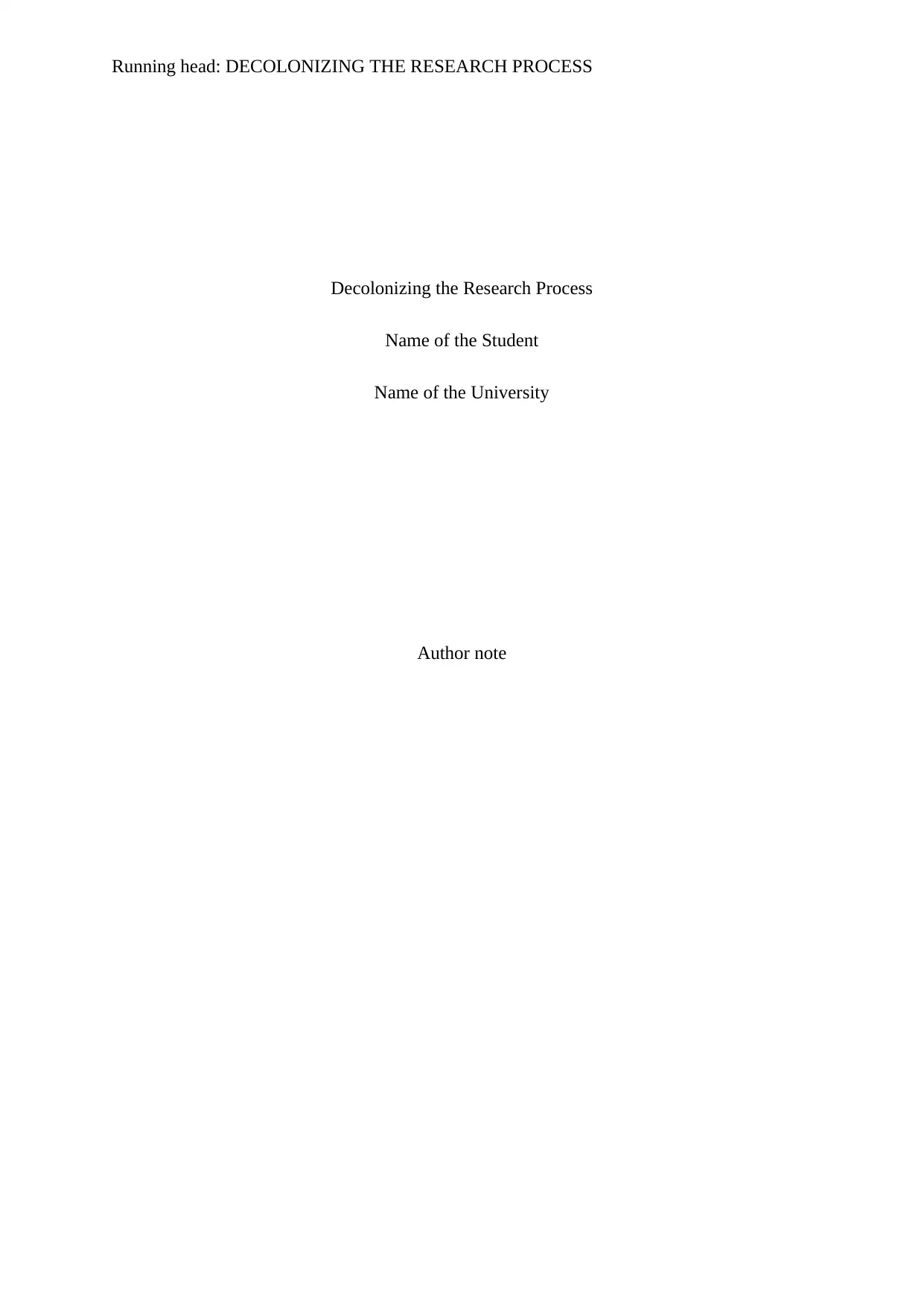
Running head: DECOLONIZING THE RESEARCH PROCESS
Decolonizing the Research Process
Name of the Student
Name of the University
Author note
Decolonizing the Research Process
Name of the Student
Name of the University
Author note
Paraphrase This Document
Need a fresh take? Get an instant paraphrase of this document with our AI Paraphraser
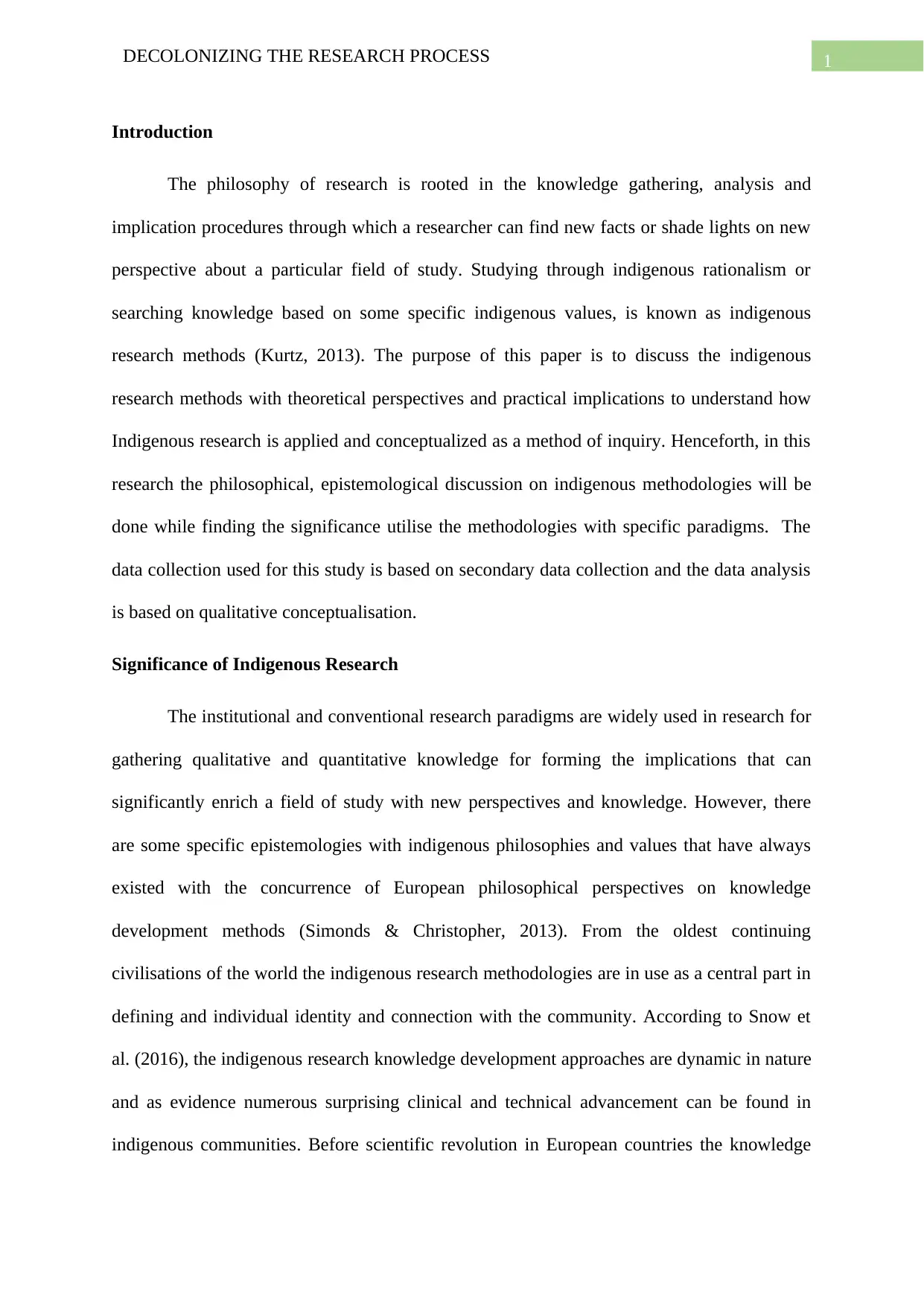
1DECOLONIZING THE RESEARCH PROCESS
Introduction
The philosophy of research is rooted in the knowledge gathering, analysis and
implication procedures through which a researcher can find new facts or shade lights on new
perspective about a particular field of study. Studying through indigenous rationalism or
searching knowledge based on some specific indigenous values, is known as indigenous
research methods (Kurtz, 2013). The purpose of this paper is to discuss the indigenous
research methods with theoretical perspectives and practical implications to understand how
Indigenous research is applied and conceptualized as a method of inquiry. Henceforth, in this
research the philosophical, epistemological discussion on indigenous methodologies will be
done while finding the significance utilise the methodologies with specific paradigms. The
data collection used for this study is based on secondary data collection and the data analysis
is based on qualitative conceptualisation.
Significance of Indigenous Research
The institutional and conventional research paradigms are widely used in research for
gathering qualitative and quantitative knowledge for forming the implications that can
significantly enrich a field of study with new perspectives and knowledge. However, there
are some specific epistemologies with indigenous philosophies and values that have always
existed with the concurrence of European philosophical perspectives on knowledge
development methods (Simonds & Christopher, 2013). From the oldest continuing
civilisations of the world the indigenous research methodologies are in use as a central part in
defining and individual identity and connection with the community. According to Snow et
al. (2016), the indigenous research knowledge development approaches are dynamic in nature
and as evidence numerous surprising clinical and technical advancement can be found in
indigenous communities. Before scientific revolution in European countries the knowledge
Introduction
The philosophy of research is rooted in the knowledge gathering, analysis and
implication procedures through which a researcher can find new facts or shade lights on new
perspective about a particular field of study. Studying through indigenous rationalism or
searching knowledge based on some specific indigenous values, is known as indigenous
research methods (Kurtz, 2013). The purpose of this paper is to discuss the indigenous
research methods with theoretical perspectives and practical implications to understand how
Indigenous research is applied and conceptualized as a method of inquiry. Henceforth, in this
research the philosophical, epistemological discussion on indigenous methodologies will be
done while finding the significance utilise the methodologies with specific paradigms. The
data collection used for this study is based on secondary data collection and the data analysis
is based on qualitative conceptualisation.
Significance of Indigenous Research
The institutional and conventional research paradigms are widely used in research for
gathering qualitative and quantitative knowledge for forming the implications that can
significantly enrich a field of study with new perspectives and knowledge. However, there
are some specific epistemologies with indigenous philosophies and values that have always
existed with the concurrence of European philosophical perspectives on knowledge
development methods (Simonds & Christopher, 2013). From the oldest continuing
civilisations of the world the indigenous research methodologies are in use as a central part in
defining and individual identity and connection with the community. According to Snow et
al. (2016), the indigenous research knowledge development approaches are dynamic in nature
and as evidence numerous surprising clinical and technical advancement can be found in
indigenous communities. Before scientific revolution in European countries the knowledge
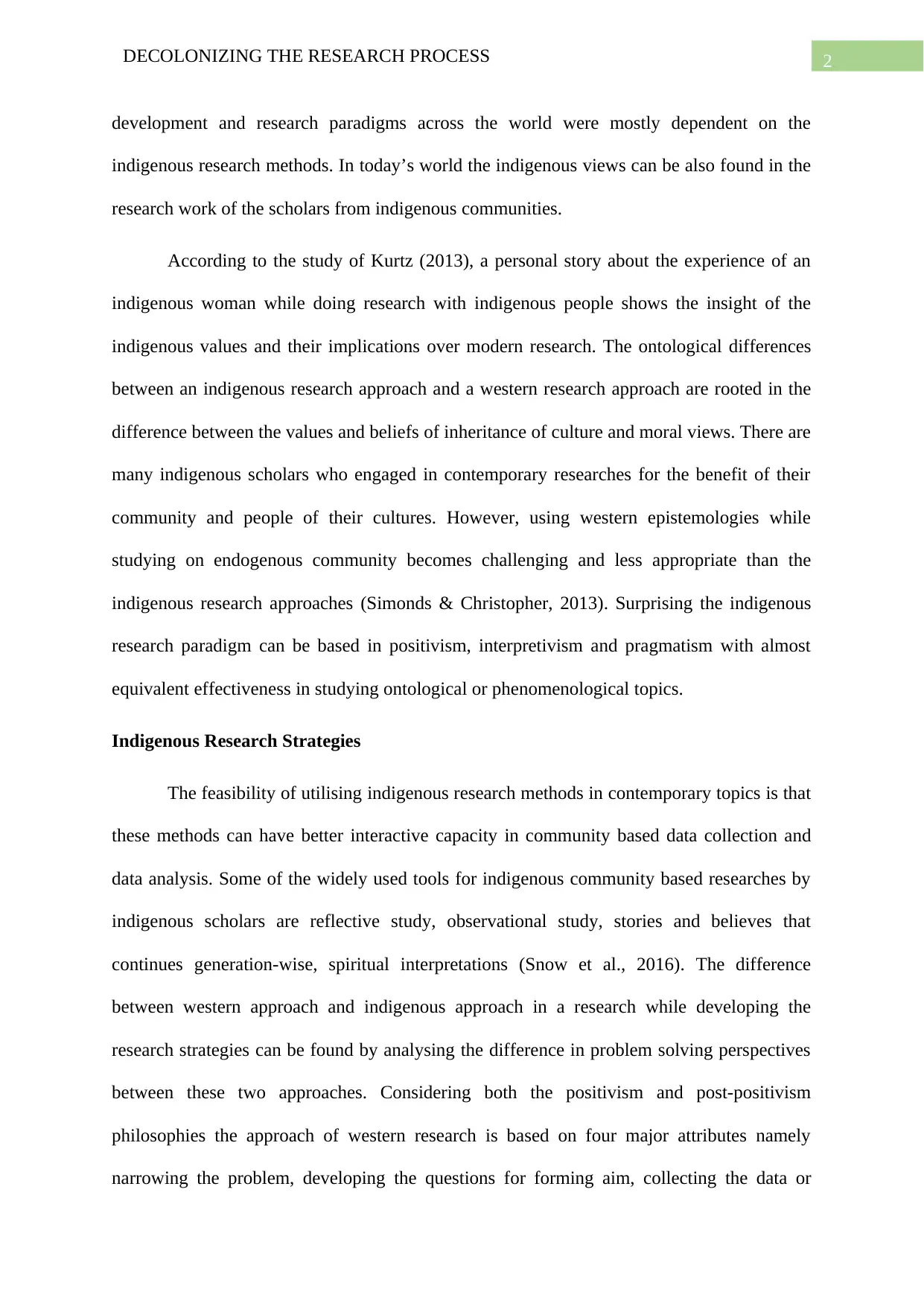
2DECOLONIZING THE RESEARCH PROCESS
development and research paradigms across the world were mostly dependent on the
indigenous research methods. In today’s world the indigenous views can be also found in the
research work of the scholars from indigenous communities.
According to the study of Kurtz (2013), a personal story about the experience of an
indigenous woman while doing research with indigenous people shows the insight of the
indigenous values and their implications over modern research. The ontological differences
between an indigenous research approach and a western research approach are rooted in the
difference between the values and beliefs of inheritance of culture and moral views. There are
many indigenous scholars who engaged in contemporary researches for the benefit of their
community and people of their cultures. However, using western epistemologies while
studying on endogenous community becomes challenging and less appropriate than the
indigenous research approaches (Simonds & Christopher, 2013). Surprising the indigenous
research paradigm can be based in positivism, interpretivism and pragmatism with almost
equivalent effectiveness in studying ontological or phenomenological topics.
Indigenous Research Strategies
The feasibility of utilising indigenous research methods in contemporary topics is that
these methods can have better interactive capacity in community based data collection and
data analysis. Some of the widely used tools for indigenous community based researches by
indigenous scholars are reflective study, observational study, stories and believes that
continues generation-wise, spiritual interpretations (Snow et al., 2016). The difference
between western approach and indigenous approach in a research while developing the
research strategies can be found by analysing the difference in problem solving perspectives
between these two approaches. Considering both the positivism and post-positivism
philosophies the approach of western research is based on four major attributes namely
narrowing the problem, developing the questions for forming aim, collecting the data or
development and research paradigms across the world were mostly dependent on the
indigenous research methods. In today’s world the indigenous views can be also found in the
research work of the scholars from indigenous communities.
According to the study of Kurtz (2013), a personal story about the experience of an
indigenous woman while doing research with indigenous people shows the insight of the
indigenous values and their implications over modern research. The ontological differences
between an indigenous research approach and a western research approach are rooted in the
difference between the values and beliefs of inheritance of culture and moral views. There are
many indigenous scholars who engaged in contemporary researches for the benefit of their
community and people of their cultures. However, using western epistemologies while
studying on endogenous community becomes challenging and less appropriate than the
indigenous research approaches (Simonds & Christopher, 2013). Surprising the indigenous
research paradigm can be based in positivism, interpretivism and pragmatism with almost
equivalent effectiveness in studying ontological or phenomenological topics.
Indigenous Research Strategies
The feasibility of utilising indigenous research methods in contemporary topics is that
these methods can have better interactive capacity in community based data collection and
data analysis. Some of the widely used tools for indigenous community based researches by
indigenous scholars are reflective study, observational study, stories and believes that
continues generation-wise, spiritual interpretations (Snow et al., 2016). The difference
between western approach and indigenous approach in a research while developing the
research strategies can be found by analysing the difference in problem solving perspectives
between these two approaches. Considering both the positivism and post-positivism
philosophies the approach of western research is based on four major attributes namely
narrowing the problem, developing the questions for forming aim, collecting the data or
⊘ This is a preview!⊘
Do you want full access?
Subscribe today to unlock all pages.

Trusted by 1+ million students worldwide
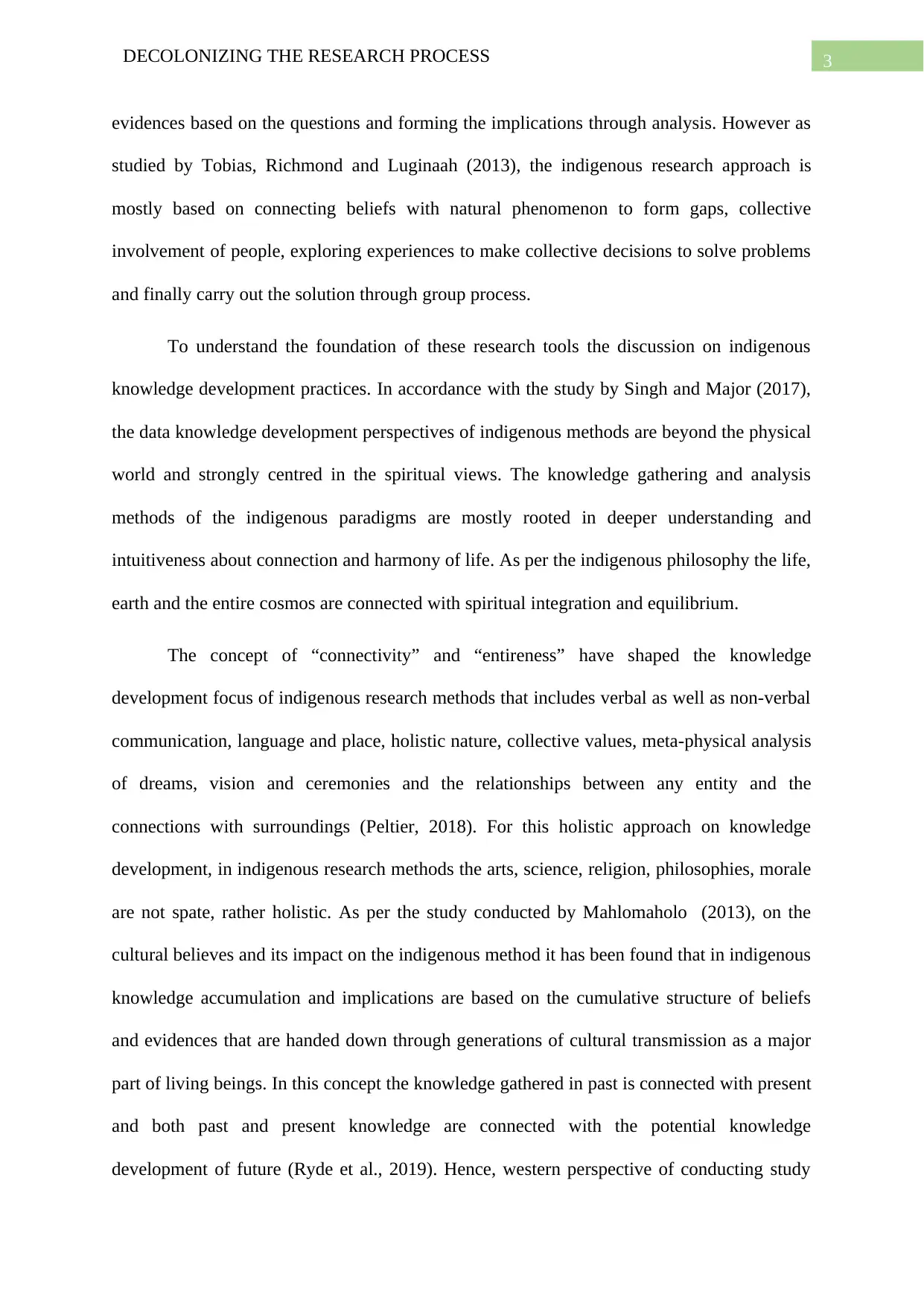
3DECOLONIZING THE RESEARCH PROCESS
evidences based on the questions and forming the implications through analysis. However as
studied by Tobias, Richmond and Luginaah (2013), the indigenous research approach is
mostly based on connecting beliefs with natural phenomenon to form gaps, collective
involvement of people, exploring experiences to make collective decisions to solve problems
and finally carry out the solution through group process.
To understand the foundation of these research tools the discussion on indigenous
knowledge development practices. In accordance with the study by Singh and Major (2017),
the data knowledge development perspectives of indigenous methods are beyond the physical
world and strongly centred in the spiritual views. The knowledge gathering and analysis
methods of the indigenous paradigms are mostly rooted in deeper understanding and
intuitiveness about connection and harmony of life. As per the indigenous philosophy the life,
earth and the entire cosmos are connected with spiritual integration and equilibrium.
The concept of “connectivity” and “entireness” have shaped the knowledge
development focus of indigenous research methods that includes verbal as well as non-verbal
communication, language and place, holistic nature, collective values, meta-physical analysis
of dreams, vision and ceremonies and the relationships between any entity and the
connections with surroundings (Peltier, 2018). For this holistic approach on knowledge
development, in indigenous research methods the arts, science, religion, philosophies, morale
are not spate, rather holistic. As per the study conducted by Mahlomaholo (2013), on the
cultural believes and its impact on the indigenous method it has been found that in indigenous
knowledge accumulation and implications are based on the cumulative structure of beliefs
and evidences that are handed down through generations of cultural transmission as a major
part of living beings. In this concept the knowledge gathered in past is connected with present
and both past and present knowledge are connected with the potential knowledge
development of future (Ryde et al., 2019). Hence, western perspective of conducting study
evidences based on the questions and forming the implications through analysis. However as
studied by Tobias, Richmond and Luginaah (2013), the indigenous research approach is
mostly based on connecting beliefs with natural phenomenon to form gaps, collective
involvement of people, exploring experiences to make collective decisions to solve problems
and finally carry out the solution through group process.
To understand the foundation of these research tools the discussion on indigenous
knowledge development practices. In accordance with the study by Singh and Major (2017),
the data knowledge development perspectives of indigenous methods are beyond the physical
world and strongly centred in the spiritual views. The knowledge gathering and analysis
methods of the indigenous paradigms are mostly rooted in deeper understanding and
intuitiveness about connection and harmony of life. As per the indigenous philosophy the life,
earth and the entire cosmos are connected with spiritual integration and equilibrium.
The concept of “connectivity” and “entireness” have shaped the knowledge
development focus of indigenous research methods that includes verbal as well as non-verbal
communication, language and place, holistic nature, collective values, meta-physical analysis
of dreams, vision and ceremonies and the relationships between any entity and the
connections with surroundings (Peltier, 2018). For this holistic approach on knowledge
development, in indigenous research methods the arts, science, religion, philosophies, morale
are not spate, rather holistic. As per the study conducted by Mahlomaholo (2013), on the
cultural believes and its impact on the indigenous method it has been found that in indigenous
knowledge accumulation and implications are based on the cumulative structure of beliefs
and evidences that are handed down through generations of cultural transmission as a major
part of living beings. In this concept the knowledge gathered in past is connected with present
and both past and present knowledge are connected with the potential knowledge
development of future (Ryde et al., 2019). Hence, western perspective of conducting study
Paraphrase This Document
Need a fresh take? Get an instant paraphrase of this document with our AI Paraphraser
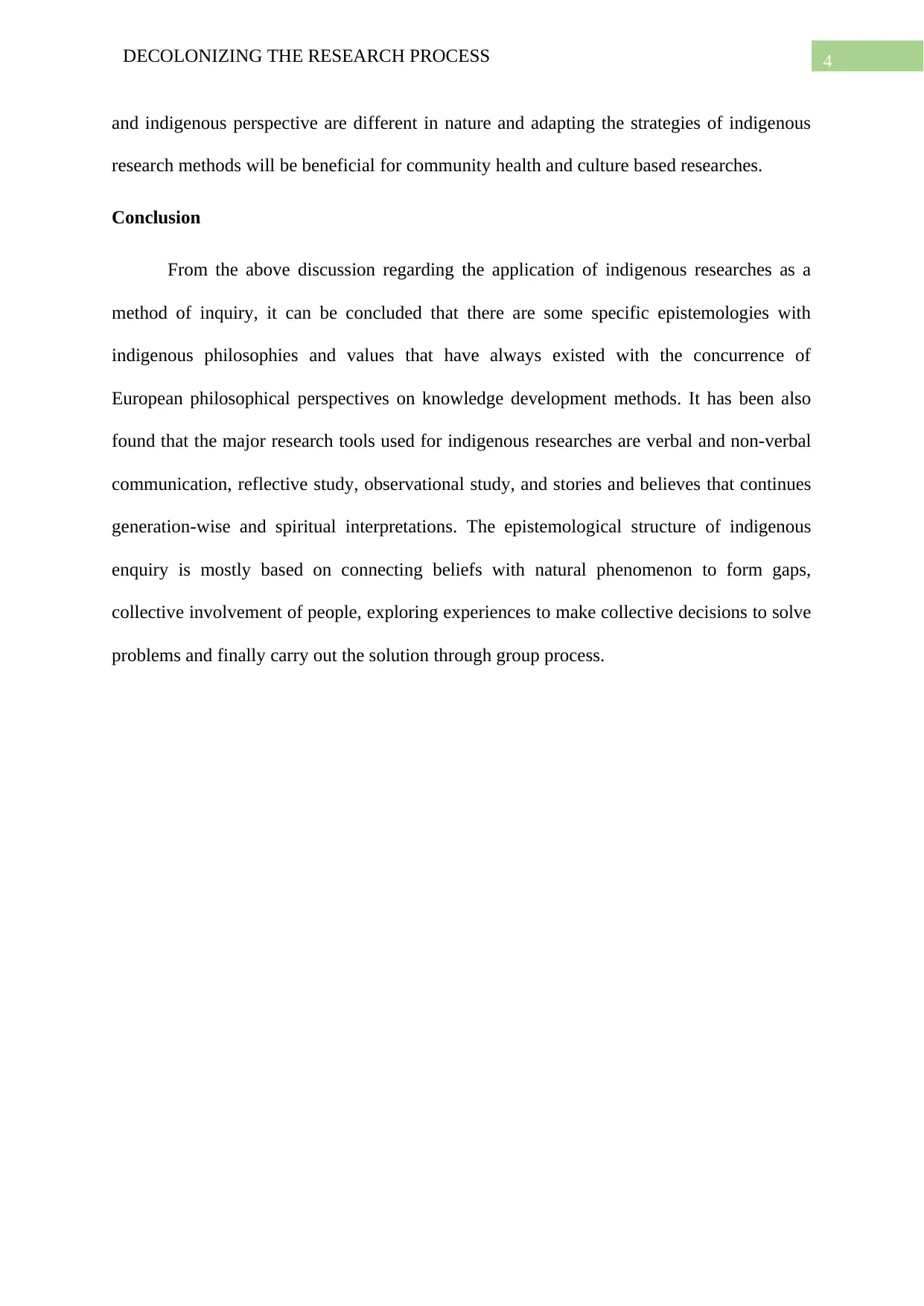
4DECOLONIZING THE RESEARCH PROCESS
and indigenous perspective are different in nature and adapting the strategies of indigenous
research methods will be beneficial for community health and culture based researches.
Conclusion
From the above discussion regarding the application of indigenous researches as a
method of inquiry, it can be concluded that there are some specific epistemologies with
indigenous philosophies and values that have always existed with the concurrence of
European philosophical perspectives on knowledge development methods. It has been also
found that the major research tools used for indigenous researches are verbal and non-verbal
communication, reflective study, observational study, and stories and believes that continues
generation-wise and spiritual interpretations. The epistemological structure of indigenous
enquiry is mostly based on connecting beliefs with natural phenomenon to form gaps,
collective involvement of people, exploring experiences to make collective decisions to solve
problems and finally carry out the solution through group process.
and indigenous perspective are different in nature and adapting the strategies of indigenous
research methods will be beneficial for community health and culture based researches.
Conclusion
From the above discussion regarding the application of indigenous researches as a
method of inquiry, it can be concluded that there are some specific epistemologies with
indigenous philosophies and values that have always existed with the concurrence of
European philosophical perspectives on knowledge development methods. It has been also
found that the major research tools used for indigenous researches are verbal and non-verbal
communication, reflective study, observational study, and stories and believes that continues
generation-wise and spiritual interpretations. The epistemological structure of indigenous
enquiry is mostly based on connecting beliefs with natural phenomenon to form gaps,
collective involvement of people, exploring experiences to make collective decisions to solve
problems and finally carry out the solution through group process.
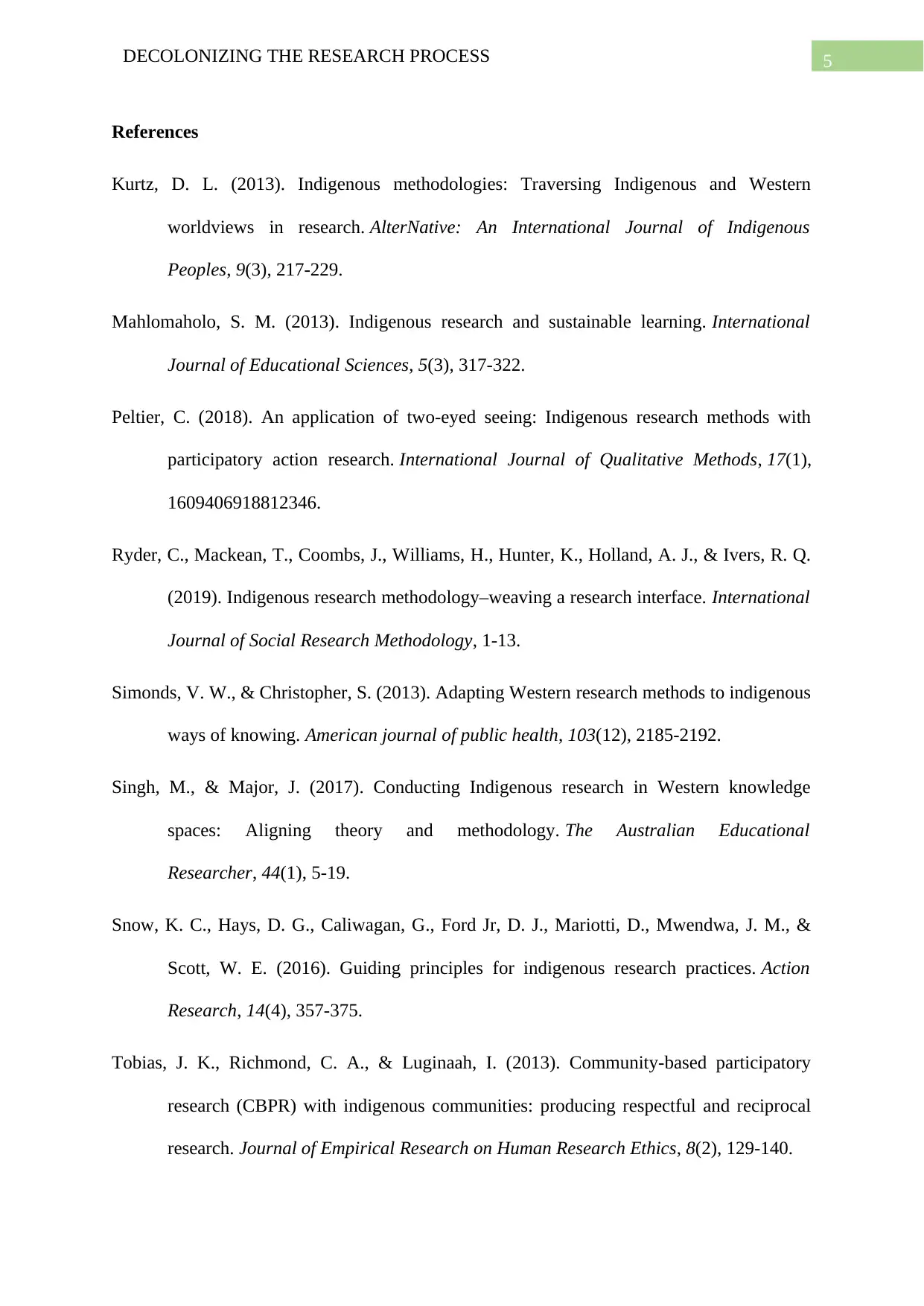
5DECOLONIZING THE RESEARCH PROCESS
References
Kurtz, D. L. (2013). Indigenous methodologies: Traversing Indigenous and Western
worldviews in research. AlterNative: An International Journal of Indigenous
Peoples, 9(3), 217-229.
Mahlomaholo, S. M. (2013). Indigenous research and sustainable learning. International
Journal of Educational Sciences, 5(3), 317-322.
Peltier, C. (2018). An application of two-eyed seeing: Indigenous research methods with
participatory action research. International Journal of Qualitative Methods, 17(1),
1609406918812346.
Ryder, C., Mackean, T., Coombs, J., Williams, H., Hunter, K., Holland, A. J., & Ivers, R. Q.
(2019). Indigenous research methodology–weaving a research interface. International
Journal of Social Research Methodology, 1-13.
Simonds, V. W., & Christopher, S. (2013). Adapting Western research methods to indigenous
ways of knowing. American journal of public health, 103(12), 2185-2192.
Singh, M., & Major, J. (2017). Conducting Indigenous research in Western knowledge
spaces: Aligning theory and methodology. The Australian Educational
Researcher, 44(1), 5-19.
Snow, K. C., Hays, D. G., Caliwagan, G., Ford Jr, D. J., Mariotti, D., Mwendwa, J. M., &
Scott, W. E. (2016). Guiding principles for indigenous research practices. Action
Research, 14(4), 357-375.
Tobias, J. K., Richmond, C. A., & Luginaah, I. (2013). Community-based participatory
research (CBPR) with indigenous communities: producing respectful and reciprocal
research. Journal of Empirical Research on Human Research Ethics, 8(2), 129-140.
References
Kurtz, D. L. (2013). Indigenous methodologies: Traversing Indigenous and Western
worldviews in research. AlterNative: An International Journal of Indigenous
Peoples, 9(3), 217-229.
Mahlomaholo, S. M. (2013). Indigenous research and sustainable learning. International
Journal of Educational Sciences, 5(3), 317-322.
Peltier, C. (2018). An application of two-eyed seeing: Indigenous research methods with
participatory action research. International Journal of Qualitative Methods, 17(1),
1609406918812346.
Ryder, C., Mackean, T., Coombs, J., Williams, H., Hunter, K., Holland, A. J., & Ivers, R. Q.
(2019). Indigenous research methodology–weaving a research interface. International
Journal of Social Research Methodology, 1-13.
Simonds, V. W., & Christopher, S. (2013). Adapting Western research methods to indigenous
ways of knowing. American journal of public health, 103(12), 2185-2192.
Singh, M., & Major, J. (2017). Conducting Indigenous research in Western knowledge
spaces: Aligning theory and methodology. The Australian Educational
Researcher, 44(1), 5-19.
Snow, K. C., Hays, D. G., Caliwagan, G., Ford Jr, D. J., Mariotti, D., Mwendwa, J. M., &
Scott, W. E. (2016). Guiding principles for indigenous research practices. Action
Research, 14(4), 357-375.
Tobias, J. K., Richmond, C. A., & Luginaah, I. (2013). Community-based participatory
research (CBPR) with indigenous communities: producing respectful and reciprocal
research. Journal of Empirical Research on Human Research Ethics, 8(2), 129-140.
⊘ This is a preview!⊘
Do you want full access?
Subscribe today to unlock all pages.

Trusted by 1+ million students worldwide
1 out of 6
Related Documents
Your All-in-One AI-Powered Toolkit for Academic Success.
+13062052269
info@desklib.com
Available 24*7 on WhatsApp / Email
![[object Object]](/_next/static/media/star-bottom.7253800d.svg)
Unlock your academic potential
Copyright © 2020–2026 A2Z Services. All Rights Reserved. Developed and managed by ZUCOL.





